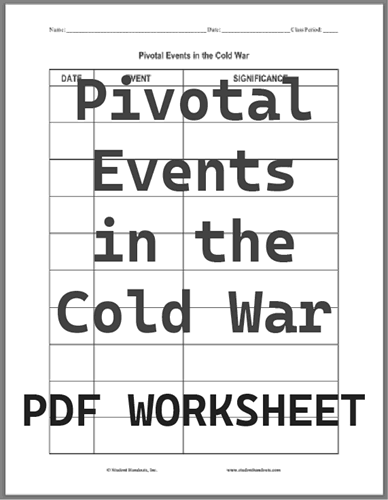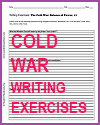| Pivotal Events in the Cold War Chart Worksheet |
|---|
| www.studenthandouts.com ↣ World History ↣ Cold War ↣ Cold War Printable Worksheets |
 |
    |
|
This DIY infographic worksheet asks students to list pivotal events in the Cold War and to describe the broader significance of each event. Click here to print. Answers will vary.
Iron Curtain Speech (1946):Winston Churchill's speech in Missouri highlighted the ideological divide between Western democracies and Eastern communist countries, popularizing the term "Iron Curtain" and marking the start of Cold War rhetoric. Berlin Blockade and Airlift (1948-1949): The Soviet Union blockaded West Berlin to force the Allies out. In response, the U.S. and its allies launched a massive airlift to supply the city, showcasing Western resolve against Soviet aggression. NATO Formation (1949): The North Atlantic Treaty Organization was established as a military alliance among Western nations to counter Soviet influence and deter possible attacks. Korean War (1950-1953): This conflict saw North Korea (backed by China and the USSR) and South Korea (backed by the U.S. and UN) battle for control of the Korean Peninsula. It was one of the first military confrontations of the Cold War. Sputnik Launch (1957): The Soviet Union launched the first artificial satellite, sparking the Space Race and intensifying fears in the West of Soviet technological superiority. U-2 Incident (1960): A U.S. spy plane was shot down over Soviet airspace, derailing a planned summit and increasing Cold War tensions. Bay of Pigs Invasion (1961): A failed U.S.-backed attempt by Cuban exiles to overthrow Fidel Castro, it embarrassed the U.S. and solidified Castro's alliance with the Soviet Union. Cuban Missile Crisis (1962): The closest the Cold War came to escalating into full-scale nuclear war. Soviet missiles in Cuba led to a U.S. naval blockade and a tense standoff that ended with both sides making concessions. Vietnam War (U.S. involvement: 1965-1973): A prolonged conflict between communist North Vietnam (backed by the USSR and China) and South Vietnam (supported by the U.S.). It became a symbol of Cold War proxy wars and deeply affected American public opinion. Fall of the Berlin Wall (1989): A powerful symbol of the Cold War's end. The wall's fall marked the collapse of communist regimes across Eastern Europe and led to German reunification. |
| Cold War Books and Films | Cold War Outlines and PowerPoints |
| Cold War Maps and Pictures | Cold War Learning Games |
| Cold War Miscellany | Cold War Worksheets |
| www.studenthandouts.com ↣ World History ↣ Cold War ↣ Cold War Printable Worksheets |














































